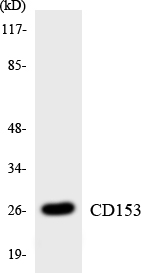CD30-L Polyclonal Antibody
- 货号:YT0750
- 应用:WB;IF;ELISA
- 种属:Human;Mouse
- 简介:
- >>Cytokine-cytokine receptor interaction
- 蛋白名称:
- Tumor necrosis factor ligand superfamily member 8
- 免疫原:
- The antiserum was produced against synthesized peptide derived from human CD153. AA range:71-120
- 特异性:
- CD30-L Polyclonal Antibody detects endogenous levels of CD30-L protein.
- 组成:
- Liquid in PBS containing 50% glycerol, 0.5% BSA and 0.02% sodium azide.
- 来源:
- Polyclonal, Rabbit,IgG
- 稀释:
- WB 1:500 - 1:2000. IF 1:200 - 1:1000. ELISA: 1:20000. Not yet tested in other applications.
- 纯化工艺:
- The antibody was affinity-purified from rabbit antiserum by affinity-chromatography using epitope-specific immunogen.
- 储存:
- -15°C to -25°C/1 year(Do not lower than -25°C)
- 其他名称:
- TNFSF8;CD30L;CD30LG;Tumor necrosis factor ligand superfamily member 8;CD30 ligand;CD30-L;CD antigen CD153
- 背景:
- The protein encoded by this gene is a cytokine that belongs to the tumor necrosis factor (TNF) ligand family. This cytokine is a ligand for TNFRSF8/CD30, which is a cell surface antigen and a marker for Hodgkin lymphoma and related hematologic malignancies. The engagement of this cytokine expressed on B cell surface plays an inhibitory role in modulating Ig class switch. This cytokine was shown to enhance cell proliferation of some lymphoma cell lines, while to induce cell death and reduce cell proliferation of other lymphoma cell lines. The pleiotropic biologic activities of this cytokine on different CD30+ lymphoma cell lines may play a pathophysiologic role in Hodgkin's and some non-Hodgkin's lymphomas. Two transcript variants encoding different isoforms have been found for this gene. [provided by RefSeq, Nov 2011],
- 功能:
- function:Cytokine that binds to TNFRSF8/CD30. Induces proliferation of T-cells.,similarity:Belongs to the tumor necrosis factor family.,subunit:Homotrimer.,
- 细胞定位:
- Membrane; Single-pass type II membrane protein.

- Western blot analysis of lysates from RAW264.7 cells, using CD153 Antibody. The lane on the right is blocked with the synthesized peptide.

- Western blot analysis of the lysates from K562 cells using CD153 antibody.





